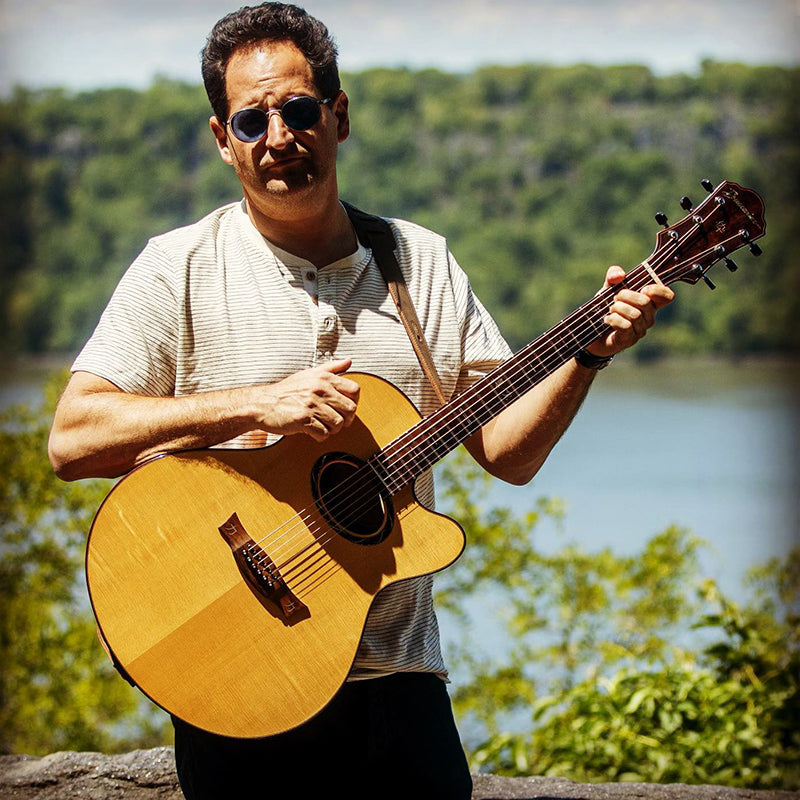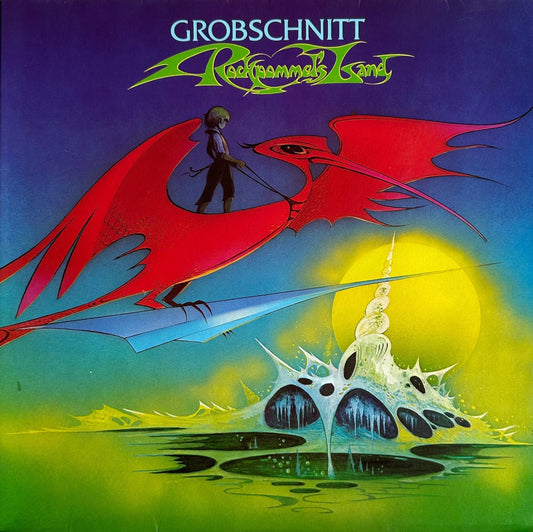In a world where more and more people find themselves unable to consume more than a few minutes – or seconds – of media at a time, Gideon King is bucking the trend and making music that speaks to his soul.
As the leader of New York City soul/jazz outfit Gideon King & City Blog, he takes what he does pretty damn seriously. Of course, the entire project (and its success or failure), in many ways, rests on his capable shoulders. But that's not the heaviest part of the whole thing.
The really weighty stuff comes in through the exhaustive creative process that the veteran guitar wizard and multi-instrumentalist undertakes as he opens up his musical soul. And in doing so, a kaleidoscope world brimming with expansive sights and sounds is vividly apparent to everyone in his orbit.
King's latest installment, an EP titled Splinters, is yet another example of the ever-inventive musician's hyperactive creativity. (Copper’s Ray Chelstowski interviewed King about his 2022 EP Whatchya Gonna Do in Issue 155.) To some, King embodies a modern-day musical genius (and he’s been called that), while for others, he's a rare example of success via jazz in a pop-dominated era. But to King, none of that matters.

Gideon King & City Blog, Splinters, album cover.
What does matter, is that the music he chooses – keyword – to make speaks to his soul, and his bandmates and listeners. In an age where ever-more soulless, trivial, bland, and forgettable tunes crop up daily, for Gideon King, the possibilities are truly endless.
In support of the Splinters EP, Gideon King talked with Copper to recount his origins in music, while giving a snapshot of his creative process as well as his opinions on the state of music today.
Andrew Daly: When did music first enter your life?
Gideon King: A heightened consciousness of music visited me when I was about seven years old. My brother was sort of a prodigy jazz piano player, and I went to sleep almost every night hearing him develop into a great modern jazz piano player. At the same time, my hippie sisters were listening to Neil Young and the like and standing by the genius of these rockers. Of course, my parents insisted classical music was the revealed word. They were all right and wrong, and I sat at the nexus of these competing obsessions.
AD: What moments early on shaped you as an artist?
GK: The first time I heard a truly artfully interwoven mix of rock and jazz, I was altered as a human. I realized it was okay to at once crave the complexity of jazz and, to some extent, classical music and allow the poetic abstractions of [Bob] Dylan and Neil [Young] and Steely Dan to guide my imagination. I realized one could have their musical cake and eat it too.
AD: Tell me about the recording of your new EP, Splinters.
GK: Four originals. One cover. Lots of work. Lots of fun. I'm proud of this one because the recording process for the first time largely produced what I envisioned. The musicians in my band are world-class badasses. We used a mixture of old-fashioned recording techniques with the employment of modern devices. We get in a room, usually with a skeleton [of a song], and I stand up (although our pianist often writes some chord changes for tunes) and then bring the song to life. It is chaos until a vibe somehow emerges. Controlled chaos and open minds scramble a nice egg.
AD: What sort of gear did you have to work with in the studio? Why did you make the choices you did?
GK: We use it all. Real instruments, god forbid. Real mics. Pro Tools. Analog summing mixers. Arturia [synthesizers and software]. Custom percussion (just making noises with everyday objects). I use tube amps, but mostly Fractal [Audio Systems] products for guitar tones. Fractal's stuff is pretty amazing – [they offer] all kinds of guitar [emulations]. The truth is, having a broad palette of toys allows one to shamelessly engage in trial and error. One thinks they know what they want until they hear what they need. Know what I mean?
AD: Tell me about your songwriting approach.
GK: I don't like linear themes. I don't like lyrics that tell an obvious story. This is what I hate about modern songwriting. The subtlety is largely dead. "I love you. I want your body." Garbage. Lyrics have become boring and stupid and reliant on cliches and expressions. I just want to present disparate ideas that suggest a story or idea and then let the listener create.
AD: What songs stick out most, and why?
GK: Well, we have only released two so far. "Splinters" is my favorite in many ways. I just like the movement of the chord changes and the funk chorus. It's a reflection of my love for Pat Metheny. "Turn Off The Sky" has gotten a good reception with editorial playlists. Proud of the lyrics of that one, and our percussion team created a killer vibe.
AD: What moment or moments from the sessions for Splinters stand out most to you?
GK: You know what? I think we have achieved something special. I think we have created an environment where people create without egos. We laugh and work till we drop. We don't take things personally. When an idea doesn't fly, we move on. The most special moments for me are when we abandon an idea. You have to destroy things to make anything.

Gideon King & City Blog. Courtesy of Prospect PR.
AD: What has the response been to the music so far? What experiences have you had in terms of touring and promotion?
GK: More and more people come. More and more people follow us. We ain’t Coldplay, that's for sure. We have a long way to go. The shows we have played have been packed, so that's cool. It's hard. It's hard to grow a following. It's hard to become huge when you think social media is sort of intrinsically idiotic. But what the hell…we make music.
AD: Does making music in a low-attention-span world frustrate you?
GK: Yeah, it's a joke. Music managers tell you to have short intros and "get to the hook"; otherwise, you won't get playlisted. So that is charming. All those brilliant instrumental sections of Steely Dan won't fly now? Pink Floyd wouldn't get playlisted? I don't know.
AD: How do we fix the issue?
GK: I'm not sure. The problem is that the medium, an auditory medium, has become more visual. The image is eclipsing the sound. People want music to be a sort of soundbite that helps them to dance or work out, not [something that] digs deep into their souls. Listen, these are a series of negative generalizations. Many folks appreciate great and labor-intensive music. But less and less. Sad. I eat food for the way it tastes, not the way it looks. I eat music the same way.
AD: What's next?
GK: World domination. Taylor Swift opens for us. We have over one billion streams on every song within three days of the release – that sort of thing. Or the alternative is we make more and more music and more and more people get to know us, and we scratch and claw our way to having a huge catalog of really nicely-crafted tunes that people listen to.
Header image courtesy of Gideon King.



